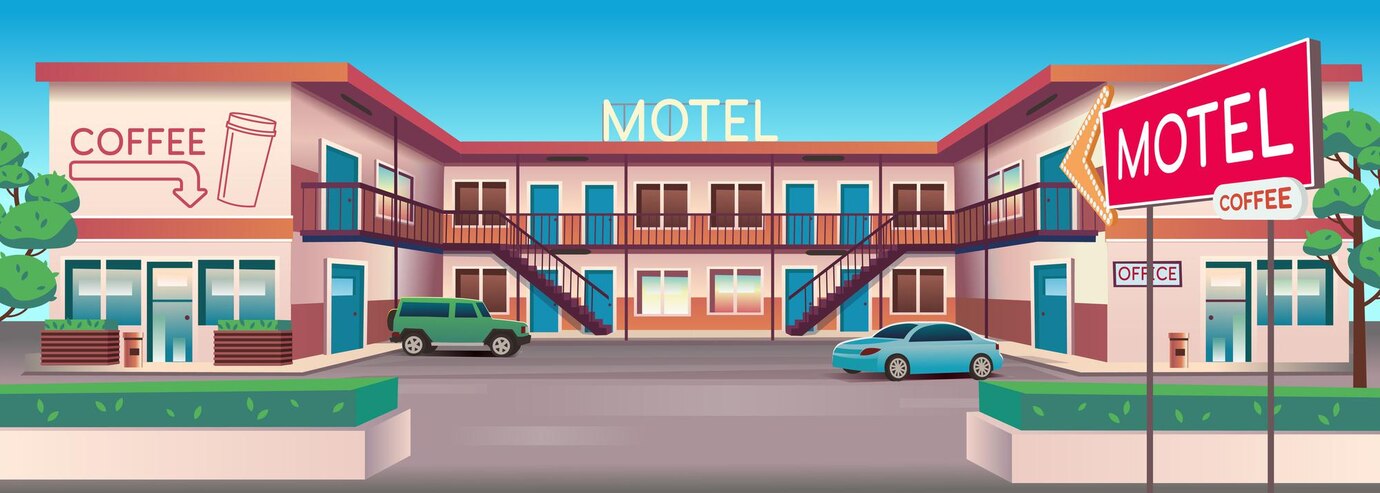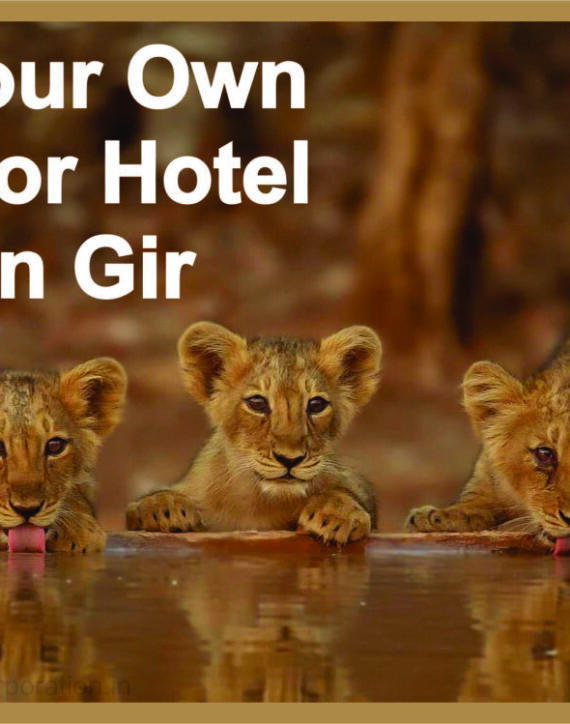What is a Motel?
A motel is a segment of the hospitality sector that provides budget accommodation primarily for road travelers. Motels cater to the needs of these travelers by offering essential facilities and services, often located along highways or major roads. The concept of motels is integral to tourism as they offer convenient lodging for people traveling by car, allowing easy access and parking facilities.
The Ministry of Tourism (MOT) of India recognizes motels as a crucial part of the tourism industry and has established guidelines for their approval and classification. These guidelines aim to standardize the quality and services provided by motels, ensuring a consistent experience for guests.
How to Start a Motel in India ?
Starting a motel involves several steps, from planning and approvals to construction and operation. Here’s a guide based on the guidelines provided by the Ministry of Tourism:
1. Project Planning and Feasibility Study
- Name and Ownership: Decide on the proposed name of the motel and establish the ownership structure (private limited company, partnership, or proprietorship).
- Site Selection: Choose a suitable location along a road, highway, or near major towns/cities. The site should be easily accessible for travelers.
- Feasibility Report: Prepare a feasibility report that includes details like the number of rooms, parking facilities, and additional amenities (restaurants, business centers, etc.).
2. Application for Approval
- Documentation: Submit a detailed application form to the Ministry of Tourism, including information about the promoters, location, site details, project plan, and compliance with environmental and safety regulations.
- Necessary Approvals: Obtain local approvals and NOCs from relevant authorities, including municipal authorities, police, pollution control boards, and the Ministry of Road Transport and Highways. Special approvals may be needed for projects near airports.
3. Design and Construction
- Building Plans: Develop blueprints and building plans, including site plans, floor plans, and elevation views. These plans should be signed by the owner and the architect and approved by the competent authority.
- Compliance with Standards: Ensure that the motel meets the standards for room sizes, facilities for differently-abled guests, eco-friendly practices, and energy/water conservation. Motels must have a minimum of 10 lettable rooms, each with outside windows/ventilation, and at least 50% of the rooms should be air-conditioned.
4. Facilities and Services
- Guest Amenities: Provide essential amenities such as clean linens, guest toiletries, safe drinking water, and daily housekeeping. Additional facilities like a restaurant, bar, conference halls, and recreational areas enhance guest experience.
- Safety and Security: Implement necessary fire safety measures, secure parking, and security features. Ensure compliance with local laws and guidelines for guest safety.
5. Operational Readiness and Approval
- Operational Compliance: Once the construction is complete, ensure all facilities are operational as per the approved plans. Apply for operational approval from the Ministry of Tourism within three months of starting operations.
- Ongoing Requirements: Submit quarterly progress reports to the Ministry of Tourism and keep all necessary licenses and approvals updated. The approval is valid for five years and must be renewed as required.
6. Marketing and Management
- Staffing: Hire qualified staff, including supervisory and skilled staff, with proper training and certification. Ensure a good level of English proficiency among front office staff.
- Marketing: Promote the motel through various channels, highlighting its location, amenities, and unique features to attract travelers.
Starting a motel requires careful planning, adherence to regulatory guidelines, and a focus on providing quality services to guests. By following these steps, you can establish a successful motel that caters to the needs of road travelers and contributes to the tourism industry.
To get approved as a motel, several major requirements must be met. Here are the key criteria:
- General Requirements:
- Full-time operation, 7 days a week, during the season.
- Establishment must have all necessary trading licenses.
- Public liability insurance is desirable.
- 24-hour lifts for buildings higher than ground plus two floors .
- Documentation:
- Detailed application form including the proposed name of the motel, promoter’s details, and status of the owner/promoter (public/private limited company, partnership, or proprietary concern).
- Location details of the motel site, including the area, title (owned/leased), and a copy of the land use permit.
- Feasibility report and detailed plans for the project, including the number and size of rooms, parking facilities, public areas, facilities for differently-abled guests, eco-friendly practices, energy and water conservation measures, fire safety, and more .
- Architectural and Safety Requirements:
- Blueprints/building plans approved by the competent authority, showing the site plan, floor plans, guest room details, and fire safety measures.
- Local approvals from municipal authorities, police, and other relevant bodies (e.g., Pollution Control Board, Ministry of Environment & Forests) .
- Specific Conditions for Certain Locations:
- For motels in the National Capital Territory (NCT) of Delhi, specific development control norms must be followed, such as minimum plot size, setback requirements, maximum ground coverage, and parking provisions .
- Financial and Operational Requirements:
- Details of the proposed capital structure, including total project cost, equity component, and debt sources.
- Application fee and acceptance of regulatory conditions .
- Approval Process:
- Approval is valid for five years or until the motel becomes operational. All documents must be valid at the time of application, and any changes in the project plan must be reported to the Ministry of Tourism .
These requirements ensure that the motel project meets the necessary standards for safety, accessibility, environmental responsibility, and operational readiness.
To get approval as a motel, specific requirements must be met, including:
- Location and Accessibility:
- Must be located on a road, highway, state, or national highway and must indicate the distance from these locations.
- Distance from the nearest railway station and airport should be specified.
- Documentation:
- Feasibility Report: A detailed feasibility report is required.
- Building Plans: Blueprints signed by the owner, architect, and approved by the competent authority, showing the site plan, front and side elevation, floor plans for all floors, and details of guest rooms and bathrooms.
- Facilities:
- Minimum of 10 lettable rooms, all with outside windows/ventilation.
- Rooms must be a minimum size of 120 sq. ft. for single occupancy, excluding bathrooms.
- Bathrooms must have a minimum size of 36 sq. ft., with specific requirements for amenities such as sanitary bins, hot and cold running water, non-porous surfaces, and energy-saving features.
- Environmental and Safety Measures:
- Eco-friendly practices like sewage treatment, rainwater harvesting, waste management, pollution control, and the use of non-CFC equipment.
- Energy and water conservation measures, including the use of CFL lamps and water-saving devices.
- Details of firefighting measures and hydrants.
- Approval and Permits:
- Approval from local authorities, including the municipal authority, police, and other relevant authorities like the Pollution Control Board and Ministry of Environment & Forests.
- If the project is near an airport, approval from the Airport Authority of India is required.
- Operational and Legal Requirements:
- Must be a full-time operation, available 7 days a week during the season.
- All necessary trading licenses and public liability insurance.
- Adherence to the Development Control Norms for Motels as prescribed by local regulations (e.g., minimum plot size, driveway width, setback, FAR, parking space, etc.).
- Miscellaneous:
- Security-related features and facilities for differently-abled guests.
- Quarterly progress reports and notification to the Ministry of Tourism once operational.
To get classified and approved as a motel, the following facilities are required:
General Requirements
- Full-time Operation: Must operate 7 days a week in season.
- Trading Licenses: Must possess all necessary trading licenses.
- Public Liability Insurance: Desirable to have insurance.
- Lifts: 24-hour lifts are necessary for buildings higher than ground plus two floors.
- Accessibility: Easy access for differently-abled guests is mandatory.
- Maintenance: All floor surfaces must be clean and in good repair.
Guest Room Requirements
- Minimum Rooms: At least 10 lettable rooms, each with outside windows/ventilation.
- Room Size: Minimum size of bedroom should be 120 sq. ft (single occupancy rooms may be 20 sq. ft smaller).
- Air-conditioning: 50% of rooms should have air-conditioning/heating, depending on climate.
- Bed and Bath Linen: Clean change of linen daily and between check-ins is necessary.
- Suites: At least 2% of room block should be suites, with a minimum of one.
Bathroom Requirements
- Attached Bathrooms: All rooms must have attached bathrooms.
- Bathroom Size: Minimum size is 36 sq. ft.
- Towels: 1 bath towel and 1 hand towel per guest.
- Guest Toiletries: Minimum of one new soap per guest.
- Sanitary Facilities: Sanitary bins with lids, non-porous surfaces, and hot and cold running water available 24 hours.
- Optional Facilities: Shower cabin, bath tubs, water-saving taps, energy-saving lighting.
Facilities for Differently Abled Guests
- Accessible Rooms: At least one room for differently-abled guests with suitable facilities.
- Accessible Public Areas: Ramps with anti-slip floors, minimum door width of one meter, accessible bathrooms and public restrooms.
Public Areas
- Lounge/Seating Area: Must have a lobby area with necessary furniture.
- Reception: 24-hour manned reception with local directions available.
- Heating/Cooling: To maintain temperatures between 20-28 degrees Celsius.
Additional Requirements
- Drinking Water: One sealed bottle of branded bottled water per person per day in the room.
- Guest Linen: Good quality linen should be provided.
- Food & Beverage: One multi-cuisine restaurant or coffee shop open from 7 a.m. to 11 p.m. and 24-hour room service.
Incentives and Financial Benefits
Now, let’s explore the incentives and financial benefits that hotels and resorts can avail themselves of under this policy:
- Capital Subsidy: Hotels and resorts are entitled to a substantial 20% capital subsidy based on eligible capital investment.
- Exemption of Electricity Duty and Reimbursement of Stamp Duty and Registration Fee: Qualifying establishments can benefit from 100% exemption from electricity duty for five years, as well as reimbursement of stamp duty and registration fees.
- Subsidy for Green Building and Sustainable Tourism Certification: Projects obtaining green building and sustainable tourism certifications from recognized authorities are eligible for subsidies.
- Market Development Assistance: Assistance is provided for participating in exhibitions and travel tourism shows nationally and internationally.





